|
|
 |
Convert RMI to AAC
|
MIDI to MP3 Converter converts RMI to AAC.
It's an ALL-IN-ONE audio converter that supports more than
120 audio and video files. The software also supports batch conversion,
and is full compatible with Windows 10/8/7/Vista/XP/2000.
- Free Download MIDI to MP3 Converter
- Install the software by instructions
- Launch MIDI to MP3 Converter
- Choose RMI Files
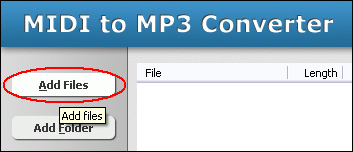
Click "Add Files" to choose RMI files and add them to conversion
list.
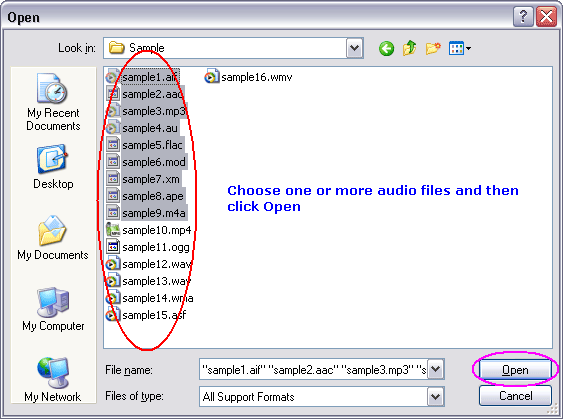
Choose one or more RMI files you want to convert and then click Open.
- Choose Target File Format
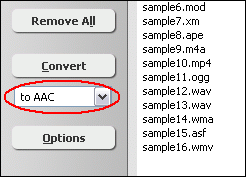
Choose "to AAC"
- Convert RMI to AAC
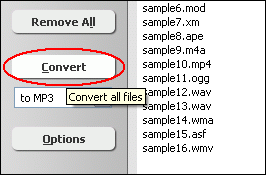
Click "Convert" to convert all RMI files to AAC format.
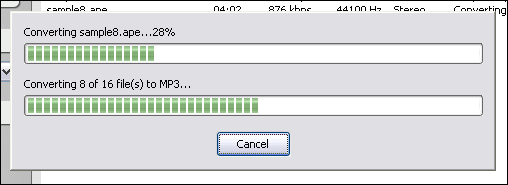
The software is converting RMI files to AAC format.
- Play & Browse
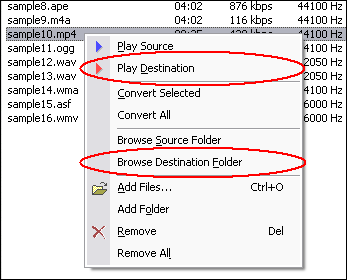
When conversion completes, you can right-click converted item and choose "Play
Destination" to play the destination file; or choose "Browse Destination
Folder" to open Windows Explorer to browse the destination file.
Top
What is RMI?
RIFF-RMID File Format. On Microsoft Windows, the system itself uses proprietary
RIFF-based MIDI files with the ".rmi" extension. Note, Standard MIDI
Files are not RIFF-compliant. A RIFF-RMID file, however, is simply a Standard
MIDI File wrapped in a RIFF chunk. By extracting the data part of the RIFF-RMID
chunk, the result will be a regular Standard MIDI File. RIFF-RMID is not an official
MMA/AMEI MIDI standard.
What is AAC?
Advanced Audio Coding (AAC) is a standardized, lossy compression and encoding
scheme for digital audio. Designed to be the successor of the MP3 format, AAC
generally achieves better sound quality than MP3 at many bit rates.
AAC has been standardized by ISO and IEC, as part of the MPEG-2 & MPEG-4
specifications. The MPEG-2 standard contains several audio coding methods, including
the MP3 coding scheme. AAC is able to include 48 full-bandwidth (up to 96 kHz)
audio channels in one stream plus 15 low frequency enhancement (LFE, limited to
120 Hz) channels and up to 15 data streams. AAC is able to achieve indistinguishable
audio quality at data rates of 320 kbit/s (64kbit/s/channel) for five channels.
The quality is close to CD also at 96 kbit/s (48kbit/s/channel) for stereo.
AAC's best known use is as the default audio format of Apple's iPhone, iPod,
iTunes, and the format used for all iTunes Store audio (with extensions for proprietary
digital rights management).
AAC is also the standard audio format for Sony's PlayStation 3 and is supported
by Sony's Playstation Portable, latest generation of Sony Walkman, Sony Ericsson
Walkman Phone, Nintendo's Wii (with the Photo Channel 1.1 update installed for
Wii consoles purchased before late 2007) and the MPEG-4 video standard. HE-AAC
is part of digital radio standards like DAB+ and Digital Radio Mondiale.
RMI to AAC Related Topics:
MIDI to AAC,
MIDI to AMR,
MIDI to M4A,
MIDI to M4B,
MIDI to M4R,
MIDI to MP4,
MIDI to OGG,
MIDI to WAV,
MIDI to WMA,
KAR to AAC,
KAR to AMR,
KAR to M4A,
KAR to M4B,
KAR to M4R,
KAR to MP3,
KAR to MP4,
KAR to OGG,
KAR to WAV,
KAR to WMA,
MID to AAC,
MID to AMR,
MID to M4A,
MID to M4B,
MID to M4R,
MID to MP3,
MID to MP4,
MID to OGG,
MID to WAV,
MID to WMA,
RMI to AAC,
RMI to AMR,
RMI to M4A,
RMI to M4B,
RMI to M4R,
RMI to MP3,
RMI to MP4,
RMI to OGG,
RMI to WAV,
RMI to WMA
|

